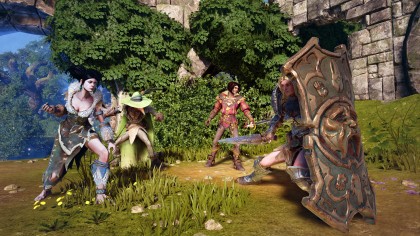Farewell Lionhead, and thanks for all the Fables
The Lionhead sleeps tonight
Using that gold to build the kind of property portfolio you could only dream of in the real world. Did I need to own almost every house, cottage, shop and shack in the land of Albion? Yes, yes I did.

That moment you catch the eye of an NPC in the gender of your choosing, starting the adorably creepy romancing system burned into Fable 2's social interaction wheel. Offer a gift from your inventory? Blow a kiss? Do a silly dance? Maybe cut a fart that's blows dangerously close to solid territory? Anything goes on the road to romance.
Wooing said object of affection, proposing with an actual ring (bought with that gold you sweated over in the smithy) and finally getting hitched. Then children (with your name!). Such bliss, your soul finally whole.
Then the game's grand journey takes you elsewhere. "I'll be back," you say with a smile that's not quite whole. I'll definitely be back. Definitely." Then you're off, gallivanting to Oakfield, Bower Lake and Bloodstone, only to do it all over again in another region. Oh the bigamy.
Surviving the hype
Did all of these features live up to the big claims of the press-charming Peter Molyneux, the front-of-house face of Lionhead for almost two decades? Of course not, but it wouldn't have been a Molyneux-era Lionhead game without the hyperbolic yet hollow 'sugar speak' of the man himself.

The fact Fable 2 was, and is, that good without meeting the overly large promises of its long-standing figurehead for so long is a testament to the passionate game design that Lionhead purveyed so well.
Sure, they tried to make a game for the destined-to-die-from-birth Kinect and it didn't work (not because the game itself was bad, but because the technology just wasn't good enough), and even had a go at a multiplayer-only brawler in the cutesy Fable Heroes (not, it wasn't great either).
Get daily insight, inspiration and deals in your inbox
Sign up for breaking news, reviews, opinion, top tech deals, and more.
And there's no doubt these charmingly yet ultimately non-financially beneficial outings helped bring about Microsoft's decision. Fable Legends was another case of the same situation - a studio taking on another genre or subgenre and taking the time to infuse it with that vital sense of charm, self-referential humour and unmistakable Britishness that was Lionhead while simultaneously painting a target on its own back..
In a world of annualised franchises, brutally slim lead times and episodic release schedules, the four years that Fable Legends had spent in development made a brilliant British studio vulnerable. And while we're all still a little raw from knowing such a titan of home-grown games development has been shuttered, at least we know games such as Fable 2 will keep that unforgettable Lionhead identity young forever more.
Thanks Lionhead, you'll not be forgotten in a hurry.